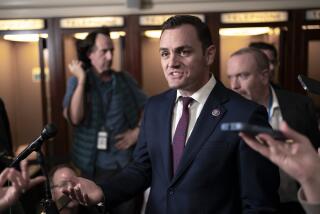Congressmen Switch Roles Over Hatch Act : Labor: Gallegly joins Democrats in voting to ease curbs on political activities of federal workers. Beilenson opposes the new plan.
- Share via
WASHINGTON — In a role reversal, Rep. Elton Gallegly (R-Simi Valley) voted with the House Democratic majority this week to ease restrictions on the political activities of federal employees while Rep. Anthony C. Beilenson (D-Woodland Hills) joined 84 Republicans to oppose the measure.
The votes were unusual in another respect: Federal employee unions were the driving force behind the legislation, and Gallegly rarely votes with labor while Beilenson, though not a solid pro-labor vote, tends to be a supporter.
Beilenson, whose 24th District includes most of Thousand Oaks, was the lone Democrat to vote against revamping the Hatch Act, which has barred most U.S. government workers from engaging in partisan politics for 54 years.
Gallegly, meanwhile, dropped his previous opposition to granting greater political freedom to federal employees. He said the reason was that “this bill had safeguards that other bills did not have.”
The measure passed the House by a vote of 339 to 85 and was sent to President Clinton, who has vowed to sign it. It was backed by 248 Democrats, 90 Republicans and one independent.
Its passage climaxed a 20-year campaign by advocates who said it would end “second-class citizenship” for most of the 3 million federal workers.
The measure permits federal employees, with some exceptions, to hold office in political parties, serve as delegates to a party nominating convention or take an active role in a political campaign, provided that they do so on their own time.
But even with the revisions, the Hatch Act still prohibits federal employees from running for office in partisan elections or raising funds from the general public. Also, about 85,000 employees of “sensitive” agencies such as the FBI, Secret Service, Central Intelligence Agency and criminal investigation units still would be barred from active political roles.
The act was passed in the wake of a 1939 scandal in which federal workers were coerced into contributing to a senator’s campaign. Some Republicans said removing restrictions would politicize the federal work force--an argument cited by President Bush in 1990 when he vetoed a similar bill.
Beilenson remained unpersuaded by arguments that civil servants were, in effect, being denied their constitutional rights.
“I’ve been voting against it for years,” he said of efforts to liberalize the restrictions. “The existing Hatch Act has worked quite well. We’ve had a nonpolitical civil service for many decades now. People have had confidence that federal employees are not political and can’t be too deeply involved in partisan politics. At the same time, it protects federal civil servants from coercion.”
Gallegly, in contrast, said he was won over by compromises in the latest version of the bill.
“I have been a supporter of the Hatch Act in the past but this bill is tougher than ones we had in the past,” he said. “I think this is a cleaner bill. This is more tempered, more moderate than in the past.”
Referring to the Hatch Act, Beilenson said “the pressure to change it came from relatively few people” in labor unions, including the National Assn. of Letter Carriers.
Throughout his career in the House, Beilenson has voted for the position favored by unions 74% of the time, according to a tally of key labor votes by the Committee on Political Education of the AFL-CIO.
For Gallegly, voting for a measure strongly supported by labor is a rarity. He has sided with labor’s position on major votes 17% of the time during his congressional tenure, according to the COPE ratings.
An aide said Gallegly “did not vote for the reforms because labor wanted him to vote that way.”
More to Read
Get the L.A. Times Politics newsletter
Deeply reported insights into legislation, politics and policy from Sacramento, Washington and beyond. In your inbox twice per week.
You may occasionally receive promotional content from the Los Angeles Times.










